- Some of these characters also double as characters from books or comics, but I tried to stay away from real people and TV characters as much as possible
- For each character, I will include a little blurb saying why I put them on the list and their defining moment in the movie(s) they are in.
- If I find it necessary to discuss any thematic elements in regards to the character, I will, but I'll keep it brief.
- Due to the nature of the list, there will probably be spoilers, so a spoiler warning is in effect.
Anyway, moving on. Here are the first ten in my 200 Best Movie Characters of All Time list!
#200

No-Face (Spirited Away, 2001)
Spirited Away is a generally awesome movie with generally awesome characters, but it's No-Face that particularly stands out for me. He doesn't really talk much, and doesn't do much until the climax of the movie, but from the first time you see him, you know he'll have some importance on the story. He follows Chihiro around and seems to take a special interest to her, after she is kind towards him and he insists upon giving her many gifts. He later swallows one of the employees at the bathhouse and continues to eat and eat, swelling to immense size, but it is Chihiro that gets him back to his original size. No-Face is an interesting and odd spirit, and his friendship with Chihiro is actually quite touching, making him my personal favourite character from the movie and one of the best animated characters of all time.
Defining Moment: The train ride to Zeniba's with Chihiro.
#191

Elle Woods (Legally Blonde, 2001)
Sorority princess turned law student, Elle Woods is a character that I generally would not enjoy if she was played by anybody else. However, it's the spirited performance of Reese Witherspoon that places this character on the list. Witherspoon gives it her all and makes Elle Woods an enjoyable and sympathetic character. She follows her ex-boyfriend to law school after he dumps her for not being "serious" enough and after being ridiculed by Selma Blair at a Halloween Party, Elle commits herself to her studies and becomes a top lawyer, taking on a murder case (where she uses her rather, unorthodox, knowledge to prove the accused innocent.) Her transformation is one of the most enjoyable ones I have seen, and she is truly a good protagonist. We want to see her win, and we want to see her be happy, and for a protagonist in a comedy, what more can you ask for?
Defining Moment: Using unorthodox knowledge of perms and shoe styles to prove her client innocent, or the Halloween Party that gets her to take her studies seriously.
#198

Defining Moment: Using unorthodox knowledge of perms and shoe styles to prove her client innocent, or the Halloween Party that gets her to take her studies seriously.
#198

Eddie Valiant (Who Framed Roger Rabbit, 1988)
Eddie Valiant is both a parody of the film-noir detective, and yet he is an example played completely straight. Valiant has prejudices against the Toons because one killed his brother (by dropping a piano on his head), and his prejudices give him trouble while working a case, which would end in him having to clear the name of Roger Rabbit. Valiant is a parody due to the silly nature of his brother's death and the fact that he works the case for a cartoon magnate and ends up having to prove the innocence of a cartoon rabbit. In all other aspects, his character is entirely played straight (he drinks like mad, he has personal demons, and he's not exactly pleasant company), and that definitely works in the film's favour. Not to mention he is played excellently by Bob Hoskins in one of his more light-hearted roles. Valiant isn't my favourite of the WFRR characters, but he is the linchpin in the series of fine performances this movie has to offer.
Defining Moment: Tough, but I'd have to say him running over the movie's villain with a steamroller in the climax. Too bad it doesn't work.
#197

Arwen (Lord of the Rings, 2001-2003)
If there is one genre that has given us a ton of memorable characters (a great many who will pop up on this list), it is the genre of sci-fi and fantasy, and one particular fantasy franchise by the name of Lord of the Rings has provided us with some of the best characters of all time. Arwen isn't the best character that the series has provided, because I'd say that for a good chunk of time, her only role is to talk softly in Elvish in overly framed sequences that are over-romanticizing a bunch of nothing, and maybe to throw in some crying every once in a while. However, I put her on the list because of one major plot point that involves her. That is her romance with Aragorn and her decision to lead a mortal life, which is fleshed out and taken seriously, not shoehorned in (as so many romances in fantasy and sci-fi often are). The whole romance with Aragorn is also better than most romances because she actually has chemistry with Viggo Mortensen. Liv Tyler gives a decent performance, not the best, but not the worst either, and the same can be said for her characterization. She is good, but there are so many more characters that Lord of the Rings has to offer.
Defining Moment: Her conversation with her father about her choice to live a mortal life with Aragorn in the third movie, or her single-handed rescuing of Frodo from the Black Riders in the first movie.
#196
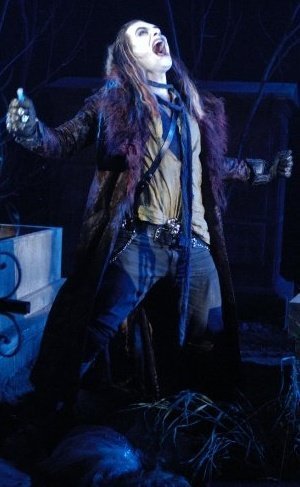
The Graverobber (Repo! The Genetic Opera, 2008)
This character is an interesting one, because in the movie, he's not given much characterization (if any), he only serves as a singing narrator and an exposition-provider. However, I put him on the list because of one simple thing: he's extremely charismatic and that makes Graverobber arguably the most popular male character in the movie (at least from its large cult following). In this world, Graverobbers siphon liquids out of the dead to make a cheap version of "zydrate" (a painkiller which many of the people living in the town are addicted to) to sell on the black market. He first meets our main character in a graveyard when she sneaks out to put flowers on her mother's grave, and he keeps popping up in the movie every now and then to provide exposition and to.....narrate, I guess. This character's placement on the list is purely based on the performance. Terrance Zdunich is excellent in the role (which should be expected, as he wrote it, probably for himself), and he portrays the character as mysterious and darkly charismatic, which is perfect, seeing as we know nothing about him. Normally, characters who exist for expository purposes are a bad omen, but Graverobber is not, and for a character who serves absolutely no importance to the plot, he is certainly one of the more entertaining ones.
Defining Moment: "21st Century Cure", our first real introduction to the character (we were introduced to him in the first musical number, but we have no idea who he is or what a Graverobber is)
#195
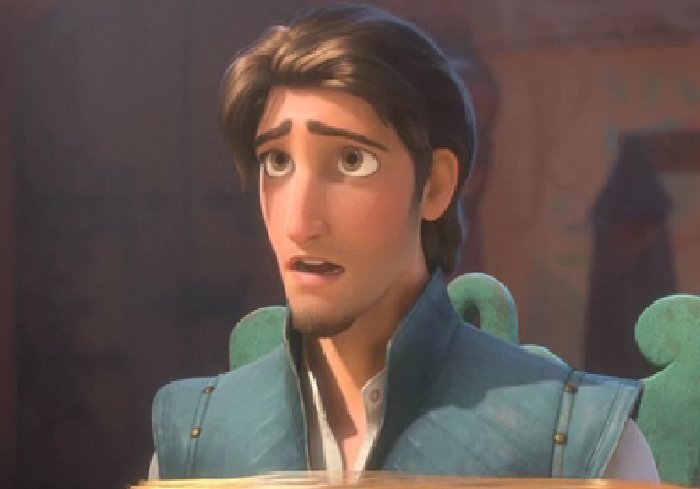
Flynn Rider (Tangled, 2010)
I put Flynn on the list because he is an amalgam of my two favourite Disney princes (Naveen and Aladdin) while still being a great stand-alone character. Flynn is easily the most entertaining human character of the movie and is a genuinely sympathetic protagonist. To explain the character, I should explain the concept of the Manic Pixie Dream Girl (or guy, in this case). The character is used when you have a movie about a depressed hero(or heroine) who's life is magically cured by having the MPDG, an upbeat young person, enter their life. Examples of this character include Giselle from Enchanted and Ramona from Scott Pilgrim, and a rare male example (alongside Flynn) is Jack from Titanic. Flynn pops into the otherwise boring and secluded life of Rapunzel entirely by chance (running from the police after stealing a valuable crown) and he ends up changing it for the better, eventually saving her from her "mother" and captor. This, coupled by great acting and surprisingly good singing from Zachary Levi, makes Flynn Rider one of the most enjoyable characters that Disney has ever created and one of my personal favourites.
Defining Moment: His almost-dying moment where he saves Rapunzel from Mother Gothel once and for all.
#194

Mark Loring (Juno, 2007)
Mark Loring is an extreme manchild, perhaps one of the best manchildren ever put on film. He is one half of the couple that Juno decides to give her baby to, and she ends up getting a bit too involved in their lives. Mark and Juno take a shine to eachother due to their common interest in rock music and horror movies, but we soon learn that Mark is bored in his marriage to the cookie-cutter Vanessa (Jennifer Garner) and bored with his general suburban existance. It isn't quite made clear whether he is sexually attracted to Juno, but it is clear that he'd rather go back to being a teenager and that he's not at all ready to grow up. Him not being willing to grow up also says that he is the last person alive who should raise a kid, as he's basically a kid himself. This is what makes him one of the most fascinating characters (manchildren especially) ever put on film and Jason Bateman's single greatest role yet.
Defining Moment: When he tells Vanessa- to her shock -that he's not ready to be a father and he wants to end the marriage.
#193

Christof (The Truman Show, 1998)
The mastermind behind the whole web of lies that is called the life of Truman Burbank, Christof runs the show from his headquarters in the "moon", and he works to keep the lie going as long as possible, even going to such extreme measures as "killing" Truman's "father" in a fishing accident to instill in him a fear of water, and creating several fake newscasts about the danger of travelling. When Truman tries to get away from Seahaven, Christof engineers several natural disasters and even "resurrects" Truman's father in desperate hope to prevent him from leaving. Christof's desperateness culminates when Truman tries to escape on the boat in the film's climax and Christof finally reveals himself. When he does, his speech to Truman raises some extremely thought-provoking questions about the concept of utopia and whether it is better to live in the crappy real world or live in a safe and happy world that is based on lies. Top off the fantastic writing with a stellar Academy Award-nominated performance from Ed Harris and you have one of the best characters of all time.
Defining Moment: His climactic speech.
#192
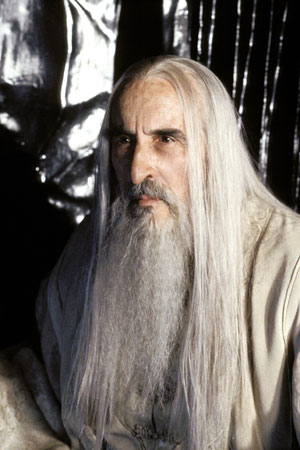
Saruman (Lord of the Rings, 2001-2003)
Saruman was one of my favourite parts of Fellowship of the Ring, and the main reason why I put him on the list was for the simple fact that he is played by Christopher Lee, an expert at the creepy villain role. He gives his all with the performances and not only does he act the part, he looks the part. In fact, he really looks the part. Christopher Lee's Hammer Horror background shows through in this, as he makes an excellent creepy secondary villain. Saruman is a servant of Sauron, and he creates an army to chase the Fellowship and seize the ring. Sadly, Saruman is not featured enough throughout the movies and I hear that his scenes were cut out of Return of the King. It's a definite tragedy that Saruman was underused, but so I hear, he was used even less in the book. I'd say his best use was in Fellowship of the Ring, but he was great in Two Towers as well, and a great character in general.
Defining Moment: His introductory conversation with Gandalf, which revealed his villainous nature.
#191
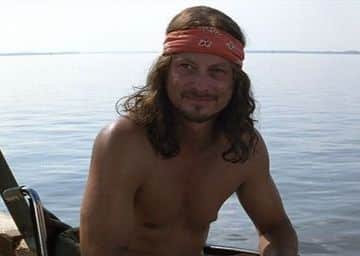
Lieutenant Dan Taylor (Forrest Gump, 1994)
I say that if there were any Oscars that deserved to be won from Forrest Gump, it were the acting nominations for Tom Hanks and Gary Sinise. Lieutenant Dan is an excellent character, and goes through an excellent transformation after losing his legs in Vietnam. He starts out as Forrest's gruff superior, but after a firing of napalm on their camp, Forrest saves Dan's life, but at the expense of Dan's legs, and Dan grows bitter and angry because of it. This character gave us a revolution in special effects (being able to magically erase Gary Sinise's legs), but he is also splendidly written and genuinely sympathetic, and we see the pain he goes through about feeling like he should have died rather than live without legs, and that makes the resolution of his character all the more satisfying and heartwarming. There's also a couple of unintentionally terrifying scenes with his character, and one of which goes down as his defining moment, so I'll talk about it in that section. However, Lieutenant Dan is probably the best developed character, and the best thing about Forrest Gump that isn't Forrest himself, and he is played brilliantly by Gary Sinise, who lost to Martin Landau for Best Supporting Actor.
Defining Moment: The unintentionally terrifying scene when Dan jumps into the water after Hurricane Carmen. I think that it was meant to symbolize something but I don't quite know what, all I know is it's freaky as hell.
#190
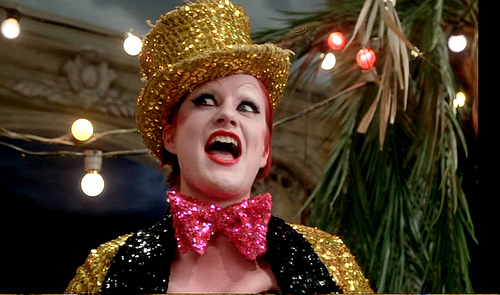
Columbia (The Rocky Horror Picture Show, 1975)
Rocky Horror is another movie that has produced a whole slew of memorable characters, many of whom will appear on this list as well, but the first of them is Columbia. I've always liked this character even though she served very little importance in the movie in general. However, Rocky Horror is one movie where I tend to make exceptions (not just in regard to character, but generally). This tap-dancing spitfire is an extremely entertaining character, and the most we really know or learn about her is that she has a boyfriend named Eddie and she's a Frank-N-Furter fangirl, which is more than likely how she got tied up with him and his servants (whether she is from Transsexual, Transylvania or not). Little Nell did well enough with her performance, although they all pale in comparison to Tim Curry. One more thing before I wrap this up, I loved the costume design for Columbia. I mean, it's just so sparkly and pretty.
Defining Moment: Her genuine horror at the revelation that it's Eddie that they are eating for dinner.
Well, I'll be continuing this in a couple days, so I hope you liked this and I hope you will like the further installments.
Defining Moment: His introductory conversation with Gandalf, which revealed his villainous nature.
#191

Lieutenant Dan Taylor (Forrest Gump, 1994)
I say that if there were any Oscars that deserved to be won from Forrest Gump, it were the acting nominations for Tom Hanks and Gary Sinise. Lieutenant Dan is an excellent character, and goes through an excellent transformation after losing his legs in Vietnam. He starts out as Forrest's gruff superior, but after a firing of napalm on their camp, Forrest saves Dan's life, but at the expense of Dan's legs, and Dan grows bitter and angry because of it. This character gave us a revolution in special effects (being able to magically erase Gary Sinise's legs), but he is also splendidly written and genuinely sympathetic, and we see the pain he goes through about feeling like he should have died rather than live without legs, and that makes the resolution of his character all the more satisfying and heartwarming. There's also a couple of unintentionally terrifying scenes with his character, and one of which goes down as his defining moment, so I'll talk about it in that section. However, Lieutenant Dan is probably the best developed character, and the best thing about Forrest Gump that isn't Forrest himself, and he is played brilliantly by Gary Sinise, who lost to Martin Landau for Best Supporting Actor.
Defining Moment: The unintentionally terrifying scene when Dan jumps into the water after Hurricane Carmen. I think that it was meant to symbolize something but I don't quite know what, all I know is it's freaky as hell.
#190

Columbia (The Rocky Horror Picture Show, 1975)
Rocky Horror is another movie that has produced a whole slew of memorable characters, many of whom will appear on this list as well, but the first of them is Columbia. I've always liked this character even though she served very little importance in the movie in general. However, Rocky Horror is one movie where I tend to make exceptions (not just in regard to character, but generally). This tap-dancing spitfire is an extremely entertaining character, and the most we really know or learn about her is that she has a boyfriend named Eddie and she's a Frank-N-Furter fangirl, which is more than likely how she got tied up with him and his servants (whether she is from Transsexual, Transylvania or not). Little Nell did well enough with her performance, although they all pale in comparison to Tim Curry. One more thing before I wrap this up, I loved the costume design for Columbia. I mean, it's just so sparkly and pretty.
Defining Moment: Her genuine horror at the revelation that it's Eddie that they are eating for dinner.
Well, I'll be continuing this in a couple days, so I hope you liked this and I hope you will like the further installments.







